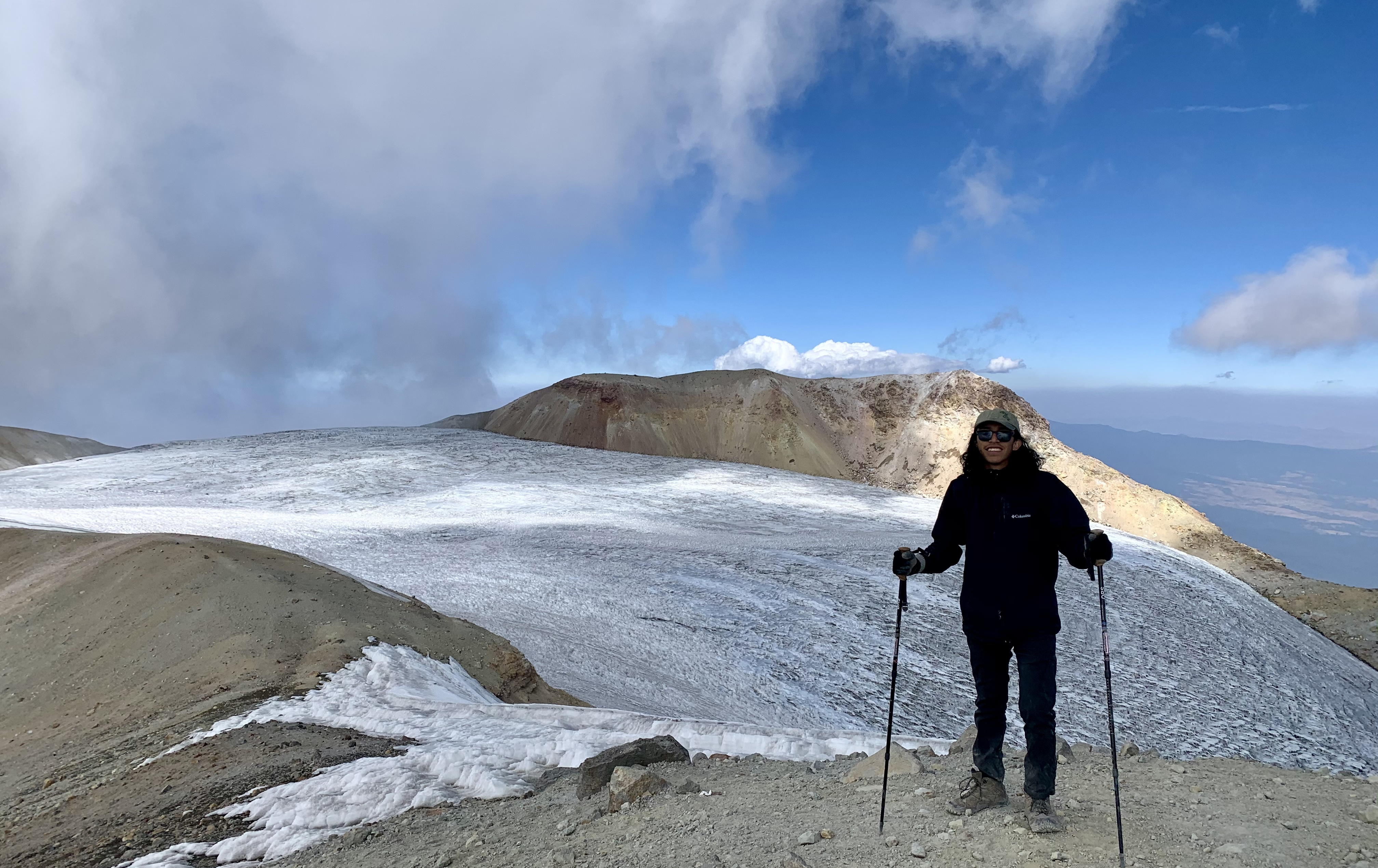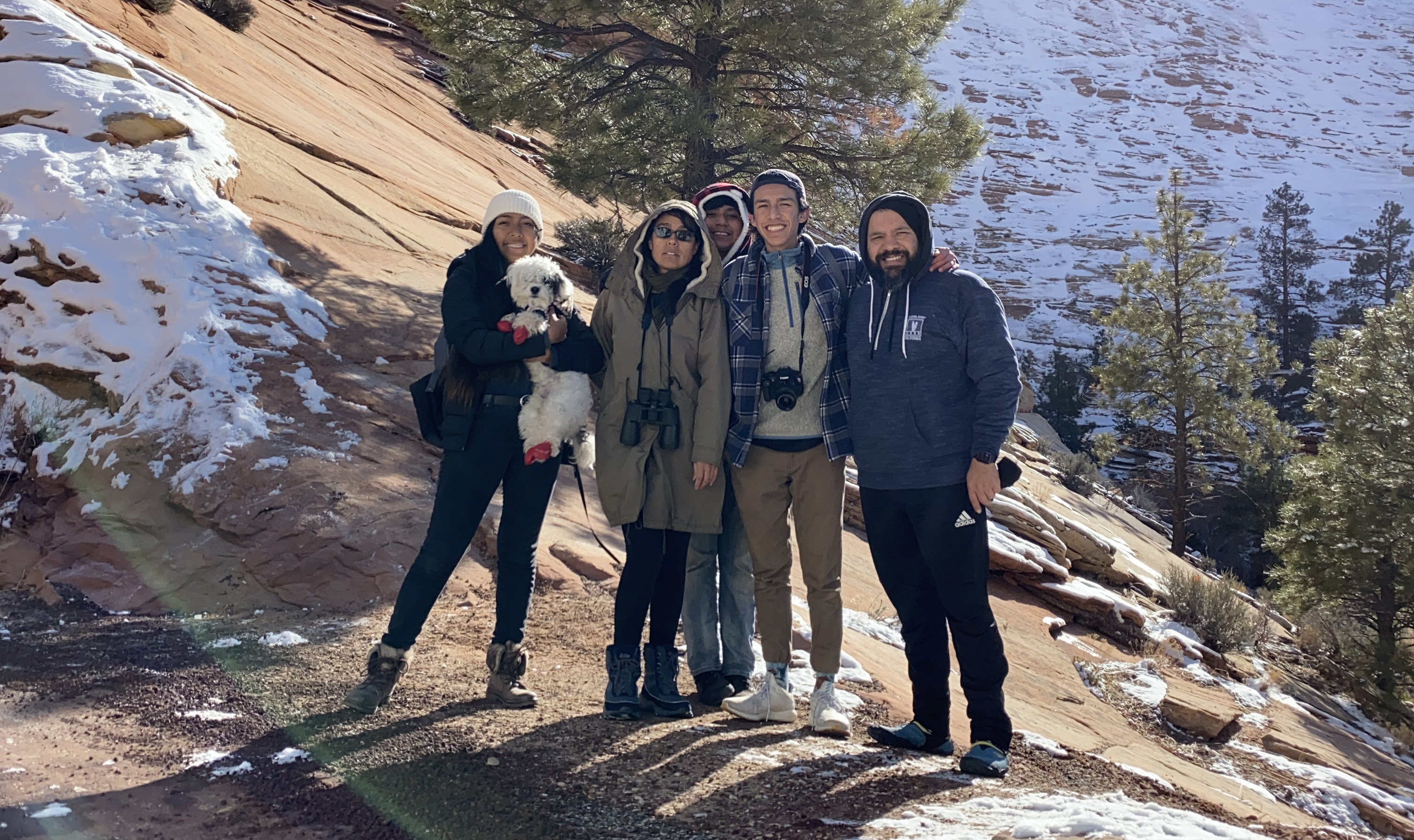
Fourth-year molecular environmental biology and ecosystem management & forestry double major Isaac Aguilar on Ixtaccíhuatl, a dormant volcanic mountain bordering the State of México and Puebla. Photo Courtesy of Isaac Aguilar.
Fourth-year Molecular Environmental Biology and Ecosystem Management and Forestry double major Isaac Aguilar channeled his affinity for the natural world into numerous research opportunities while at UC Berkeley.
Growing up in the San Diego area, Aguilar recalled spending a lot of time outdoors with his family. Whether hiking, camping, or taking in the sun and sand, Aguilar has always felt most comfortable in the great outdoors. He chose Rausser College for its strong emphasis on environmental conservation and stewardship—two qualities he has always had a deep personal connection with.
Now, Aguilar is a Doris Duke Conservation Scholar, is a member of Berkeley’s Students of Color Environmental Collective, and serves as one of Rausser College’s Peer Advising Leaders. He has conducted research throughout the U.S. and internationally, including a current self-directed project in Mexico's Sierra de Manantlán Biosphere Reserve.
This conversation has been edited for length and clarity.
What drew you to Rausser College?
I spent a lot of time outdoors with my family. We would go on camping trips or to the beach and that really instilled my appreciation for the environment. When I got accepted to Berkeley, I was interested in the amazing opportunities for field classes and really strong environmental focus in Rausser College. Growing up in California has given me an appreciation for the state’s gorgeous natural landscape, and an education at the flagship UC could help me protect it.

An avid hiker, Isaac Aguilar (second from right) said he has always felt most comfortable outdoors. Photo Courtesy of Isaac Aguilar.
How did you get involved with research opportunities on campus?
As a freshman, I was intimidated by the fast-paced research and academic environment on campus. I didn't initially see myself conducting research during my time here, but I heard of a lot of opportunities with peers, advisors, instructors, and also at a job I had over the summer. I worked at NatureBridge’s Coastal Camp, which was a really cool opportunity for me to guide kids through the Marin Headlands and teach lessons related to the environment. That experience helped me be more curious about nature and inspired me to get involved in field-based research opportunities.
Rausser College has a really awesome program called SPUR (Sponsored Projects for Undergraduate Research) which was my introduction to academic research. I started in Dr. Stephanie Carlson’s lab doing macroinvertebrate identification - looking through a microscope at beetles, flies, and other organisms that were collected from stream samples. It was a very cool opportunity to get my foot in the door with academic research. Since then, a lot of my research projects have become more advanced and even independent. Berkeley provided the resources and the opportunities to slowly, and in my own time and development, get involved in research without being too worried about the stress and the fast-paced environment that's often associated with research.
Where has your research taken you?
Last Fall, I spent a semester on Mo’orea–it’s an island in French Polynesia near Tahiti – developing my own research project, snorkeling and hiking, and working alongside peers and graduate student mentors. It was a really great opportunity to be in a new and incredible environment, learn field research skills, and write a formal research paper.
I spent a lot of time doing point count surveys to study the endemic birds. I would hike through the forest, stop every few kilometers, and record all the birds that I heard or saw over a 10-minute period. It’s a very common field strategy for doing ecological research on birds and can be used to estimate abundance. It was the first time I had done a project related to birds, so it was a really cool experience learning how to use this method and incorporate it into my research.

Isaac Aguilar (center) with researchers at the Sierra de Manantlán Biosphere Reserve in Jalisco, México. Photo Courtesy of Isaac Aguilar.
Can you tell me about your self-directed research?
Through SPUR, students can propose a student-initiated project with supervision by a faculty mentor. My project is advised by Dr. Arthur Middleton, so I've been able to meet with him and brainstorm some ideas for a research project. I’m doing a project in the Sierra de Manantlán Biosphere Reserve in Jalisco, Mexico- a region where my family is from. It's been really awesome for me to be able to learn and grow as a student researcher, and then be able to incorporate my own culture, family, and experiences from this region in Mexico into my own project.
My project will use environmental DNA (eDNA) collected from stream samples as a way to monitor biodiversity. I'm working with a biologist at the University of Guadalajara who has a network of camera traps in the region. We can compare which species are detected in the eDNA with the species documented on camera traps. The cameras have documented jaguars, pumas, armadillos, and other cool wildlife that we hope to detect in the eDNA. It’s a really great opportunity for me to grow as a student researcher, collaborate with international scientists, and study an important area—not just for me personally, but also for its biodiversity and ecological importance.
What advice would you give to students who want to pursue research but don't know where to start?
Rausser College’s SPUR program and the Undergraduate Research Apprentice Program (URAP) through the College of Letters and Science are really great opportunities to get your foot in the door. A lot of these projects are designed to be introductory research experiences that teach you important and useful skills. You can always go on to more technical or advanced research projects, and eventually, even develop your own if that’s something you’re interested in. It’s also worth reaching out to a graduate student who may be looking for assistance or a professor who might have side projects. Cold-emailing can be a great way to hear about additional opportunities.
Do you know of a student or group in Rausser College involved in noteworthy research, community outreach, or extracurricular activities? Let us know by submitting a suggestion with this nomination form.
